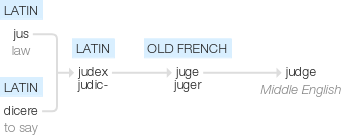Judge
Middle English: from Old French juge (noun), juger (verb), from Latin judex, judic-, from jus ‘law’ + dicere ‘to say’.
wiktionary
From Middle English juge, jugge, borrowed from Old French juge, from Latin iūdex. Displaced native Old English dēma.
From Middle English jugen, borrowed from Anglo-Norman juger, from Old French jugier, from Latin iūdicāre.
Mostly displaced native deem.
etymonline
judge (v.)
c. 1200, iugen, "examine, appraise, make a diagnosis;" c. 1300, "to form an opinion about; inflict penalty upon, punish; try (someone) and pronounce sentence," also intransitive, "make a decision, decide, think, suppose;" from Anglo-French juger, Old French jugier "to judge, pronounce judgment; pass an opinion on" (10c., Modern French juger), from Latin iudicare "to judge, to examine officially; form an opinion upon; pronounce judgment," from iudicem (nominative iudex) "a judge," a compound of ius "right, law" (see just (adj.)) + root of dicere "to say" (from PIE root *deik- "to show," also "pronounce solemnly").
Related: Judged; judging. Spelling with -dg- emerged mid-15c. The Old English word was deman (see doom (n.)). The Latin word also is the source of Spanish juzgar, Italian giudicare.
judge (n.)
mid-14c., "public officer appointed to administer the law" (early 13c. as a surname), also judge-man; from Old French juge, from Latin iudex "one who declares the law" (source also of Spanish juez, Italian giudice), a compound of ius "right, law" (see just (adj.)) + root of dicere "to say" (from PIE root *deik- "to show," also "pronounce solemnly").
Extended from late 14c. to persons to decide any sort of contest; from 1550s as "one qualified to pronounce opinion." In Jewish history, it refers to a war leader vested with temporary power (as in Book of Judges), from Latin iudex being used to translate Hebrew shophet.
